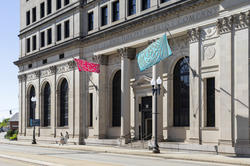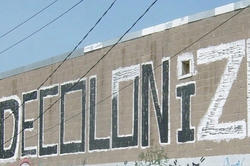Full-time faculty members to join RISD in fall 2021 as a result of the “Race in Art & Design” cluster hire initiative.
Five Questions: Derrick Woods-Morrow

Last year RISD hired a cohort of full-time faculty members focused on race, colonization, decolonization, post-coloniality, cultural representation and material practices of resistance. The educators who joined the community as part of that “Race in Art & Design” cluster hire initiative began teaching at RISD in the fall and have graciously agreed to share their unique pedagogical approaches in this series of Q&As. In this interview, we hear from faculty member Derrick Woods-Morrow.
Can you please say a little bit about yourself and your areas of academic focus?
I’m working between three departments at RISD: Painting, Sculpture and Textiles. As someone who also works in performance, film and photography, I don’t feel beholden to any one artistic medium. As many of us know, RISD’s education structure can be heavily siloed, leading students to focus heavily in one field, with little time to explore or consider how malleable and transient their exploration across different mediums could be. I am hoping my pedagogy helps integrate more interdisciplinary teaching and break down barriers concerning young artists, their ambitions and the departments with which they are affiliated.

My creative practice—my existence, really—centers dialogues around nuance and the seldom discussed in-between areas of sexual exploration, play/labor and transaction. I am coming from a Black feminist perspective—bringing scholars like Audre Lorde, Octavia Butler, Toni Morrison, Tiffany Lethabo King and bell hooks into the classroom. I’m really interested in how the body operates alongside of desire to create aesthetic language in both sexual and casually platonic situations. Americans often avoid dialogues about sex, but I am taking the opportunity to discuss these topics and make them commonplace.

What attracted you to RISD?
We’ve all heard about RISD and the prestigious schools people want to attend. I came from a school like that: the School of the Art Institute of Chicago. I was naïve when I entered grad school and thought my peers and professors would be versed in dialogues around race, sexualities and the general porous nature of existing as human. Years later, I saw The Room of Silence and could empathize with RISD students who wanted more representation. There were a lot of things in my collegiate career that weren’t great, and I felt like I wanted to give back, to right some of those wrongs. I thought RISD would be a great place to do that, and it has been a really good fit. The students are extraordinary.

What classes are you teaching and what challenges and opportunities do you face teaching through the lens of decoloniality?
I’m really interested in teaching interdisciplinary courses. I’m co-teaching a Turner Grant-funded course in the spring about pornography that will focus on the ambiguities and problematics within erotics. In terms of decoloniality, that term gets tossed around a lot and can actually mean a lot of different things. For me, it is attempting daily to decenter commonly held narratives that otherwise harm the marginalized. I hope that being here gives me the opportunity to challenge RISD as a historic art institution to support my sex-based research framed through the lens of a Black queer polysexual person. I feel that my freedom to identify however I choose is a part of the work.
“For me, teaching through the lens of decoloniality is attempting daily to decenter commonly held narratives that otherwise harm the marginalized.”
What’s the most important thing you hope students will learn in your classes?
I hope students learn they have the right to not do labor for the sake of doing labor. That’s a challenge in an institution that is heavily production-based. RISD students produce and produce and produce. I tell them they have to rest or they’re not going to be able to make good work. I encourage thoughtful, meditative and community-based making and thinking. They should know that their existence in the world is enough—that they are enough.
What is your take on RISD’s current state in terms of social equity and inclusion? What would you like to see the college focus on moving forward?
When we use words like inclusion, we give the wrong message, like we’re allowing people to be at the table rather than inviting them build whatever structure they need to survive. A more progressive acronym like DEAA—Diversity, Equity, Accessibility and Accountability—should be considered, allowing us to reframe even how we talk about the work that needs to be done. That’s where I’d like to see the institution go.
—interview by Simone Solondz
Read the whole series and learn more about RISD’s commitments to Social Equity and Inclusion.
January 31, 2022


